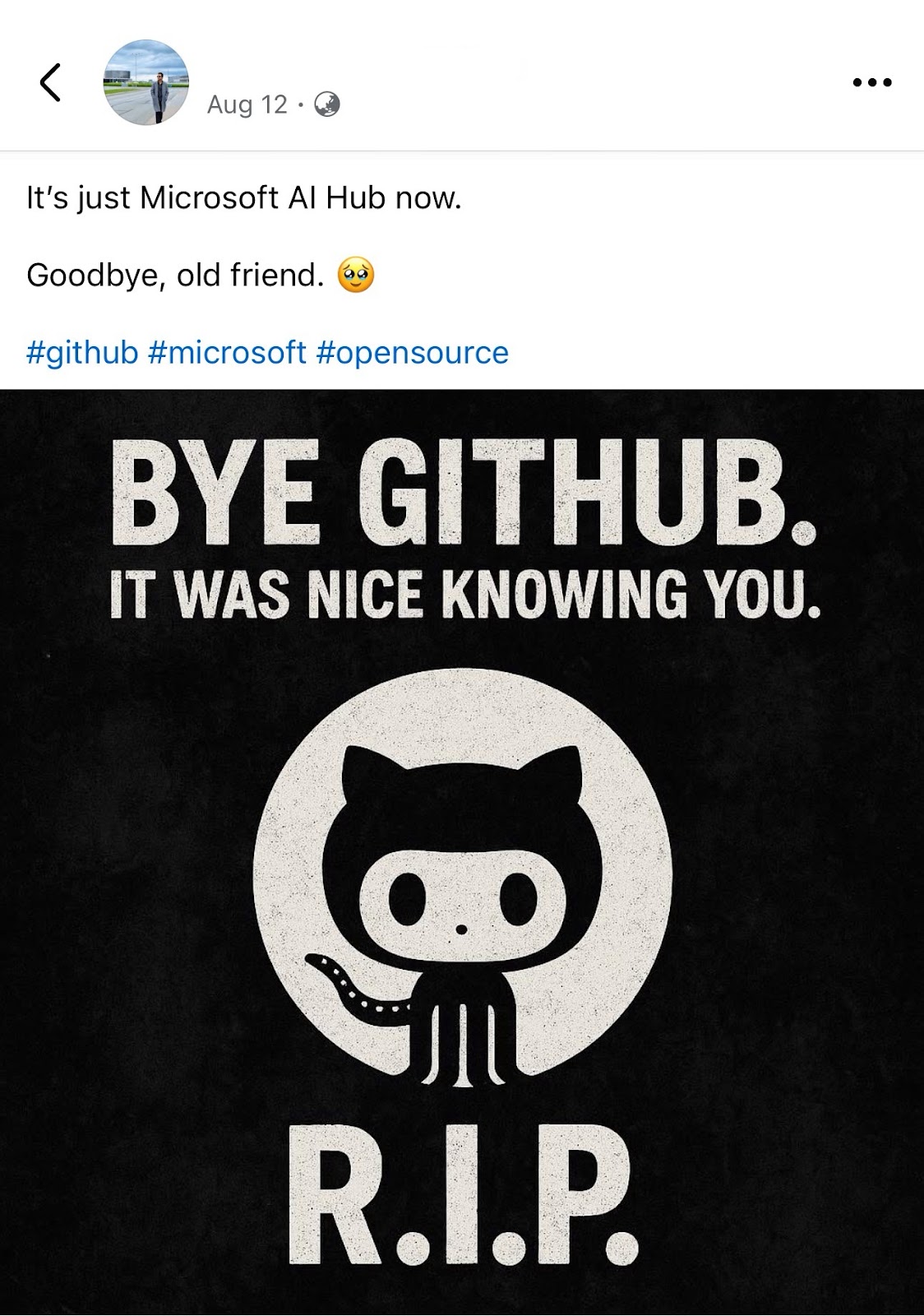Bye GitHub—Hello “Microsoft AI Hub”?
“GitHub is Microsoft AI Hub now.”

The remark, posted by a frustrated developer, has become a shorthand for unease within the open-source community. Over recent weeks, accounts of sudden user bans without clear explanation have circulated online, forcing uncomfortable questions: what happens when the world’s codebase is concentrated in a single corporate-controlled hub—and that hub decides to pull the plug?

From Community Hub to Corporate Asset
When GitHub launched in 2008, it was celebrated as the new backbone of open-source collaboration. Millions of developers gravitated to its simple interface and network effects. By 2018, Microsoft saw enough strategic value to purchase it for $7.5 billion. The acquisition was met with initial skepticism, but GitHub promised to maintain its role as a neutral platform for code.
Since then, the balance has shifted. Microsoft has increasingly positioned GitHub not just as a repository but as a testing ground for AI integration. GitHub Copilot, unveiled in 2021 and powered by OpenAI, uses machine learning trained on publicly available code—including countless open-source projects authored by unpaid contributors. For many developers, this felt like a turning point. Their work was fueling corporate AI pipelines with little recognition or say in the matter.
The Ban Controversy
The disquiet isn’t just about AI. Developers have reported abrupt account bans, often with vague reasoning and little recourse. Screenshots circulating online highlight how entire repositories and years of work can vanish overnight. To critics, this underscores the fragility of centralization: when one platform holds so much power, individual users are left vulnerable to opaque enforcement.
The issue is not whether GitHub has the right to enforce rules (it does), but whether such enforcement should be subject to corporate discretion alone. A single decision by a centralized gatekeeper can ripple across the global software ecosystem. That raises a deeper question: should the backbone of open-source collaboration be controlled like a private asset, or governed like shared infrastructure?
The AI Question
Meanwhile, GitHub’s AI push continues. Copilot has become one of Microsoft’s flagship products, widely adopted but equally controversial. Lawsuits filed in the U.S. argue that Copilot violates software licenses by reproducing snippets of code without attribution. Even among developers who don’t oppose AI-assisted coding, there’s resentment that open-source labor is being mined to build commercial products without direct compensation.
The irony is stark. On YouTube, content creators are compensated—however imperfectly—when their work drives views and ad revenue. On GitHub, developers see their code absorbed into training datasets without acknowledgment. The original ethos of open collaboration risks being repurposed into a one-way street that flows toward corporate strategy.
Centralization vs. Resilience
The controversy reflects a broader battle over digital infrastructure. Centralization offers convenience and scale, but it also creates fragility: when the central hub falters, millions of projects are disrupted. Decentralized alternatives like GitLab or self-hosted repositories offer more resilience, but they lack the network effects that make GitHub so dominant.
In crypto, advocates of decentralized finance make a similar case against traditional banking monopolies: no single actor should hold unilateral control over essential infrastructure. For open-source, the parallel is clear. The question isn’t only about GitHub bans or Copilot’s ethics—it’s about whether the digital commons can be entrusted to a corporate steward with unchecked discretion.
For now, GitHub remains the default home for most developers. Its scale, integrations, and community momentum make it difficult to leave, even for those uneasy with its direction. But the growing backlash—captured in that sharp “Microsoft AI Hub” remark—signals that trust is eroding.
This moment forces a reckoning. Will open-source continue to rely on a single centralized hub, or will developers chart a path toward platforms that reflect the values of transparency, accountability, and shared governance?
.svg)


.svg) SHARE TO FACEBOOK
SHARE TO FACEBOOK SHARE TO TWITTER/X
SHARE TO TWITTER/X SHARE TO LINKEDIN
SHARE TO LINKEDIN SEND TO MAIL
SEND TO MAIL

.svg)


.svg)